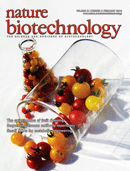 More than 40 institutes around the world are teaming up to use biotech tools to improve food security in sub-Saharan Africa and India. The Sustainable Crop Production Research for International Development (SCPRID) will provide a total £16 ($25.5) million for 11 projects aimed at developing crops that will resist pests or survive in harsh environments. Each project will include at least one UK-based partner and another from a developing nation. Grants will be funded by the UK Biotechnology and Biological Sciences Research Council (BBSRC), the Department for International Development, the Bill and Melinda Gates Foundation and India’s Department of Biotechnology and will be administered by the BBSRC. Geneticist Cristobal Uauy at the John Innes Centre in Norwich, UK, will lead a five-year sequencing project on wheat rust spread and evolution. His team, including collaborators in Kenya, Ethiopia and India, will screen germplasm from the open-access Watkins Landrace Wheat Collection. Uauy’s collaborator, pathologist Ruth Wanyera of the Kenyan Agricultural Research Institute in Njoro, aims to develop new rust-resistant wheat varieties adapted to local conditions. Although SCPRID grant holders’ intellectual property resides with their host institutions, which can conduct commercial development, they have agreed to offer BBSRC a royalty-free license to distribute technologies “at reasonable cost to people most in need in developing countries.”
More than 40 institutes around the world are teaming up to use biotech tools to improve food security in sub-Saharan Africa and India. The Sustainable Crop Production Research for International Development (SCPRID) will provide a total £16 ($25.5) million for 11 projects aimed at developing crops that will resist pests or survive in harsh environments. Each project will include at least one UK-based partner and another from a developing nation. Grants will be funded by the UK Biotechnology and Biological Sciences Research Council (BBSRC), the Department for International Development, the Bill and Melinda Gates Foundation and India’s Department of Biotechnology and will be administered by the BBSRC. Geneticist Cristobal Uauy at the John Innes Centre in Norwich, UK, will lead a five-year sequencing project on wheat rust spread and evolution. His team, including collaborators in Kenya, Ethiopia and India, will screen germplasm from the open-access Watkins Landrace Wheat Collection. Uauy’s collaborator, pathologist Ruth Wanyera of the Kenyan Agricultural Research Institute in Njoro, aims to develop new rust-resistant wheat varieties adapted to local conditions. Although SCPRID grant holders’ intellectual property resides with their host institutions, which can conduct commercial development, they have agreed to offer BBSRC a royalty-free license to distribute technologies “at reasonable cost to people most in need in developing countries.”